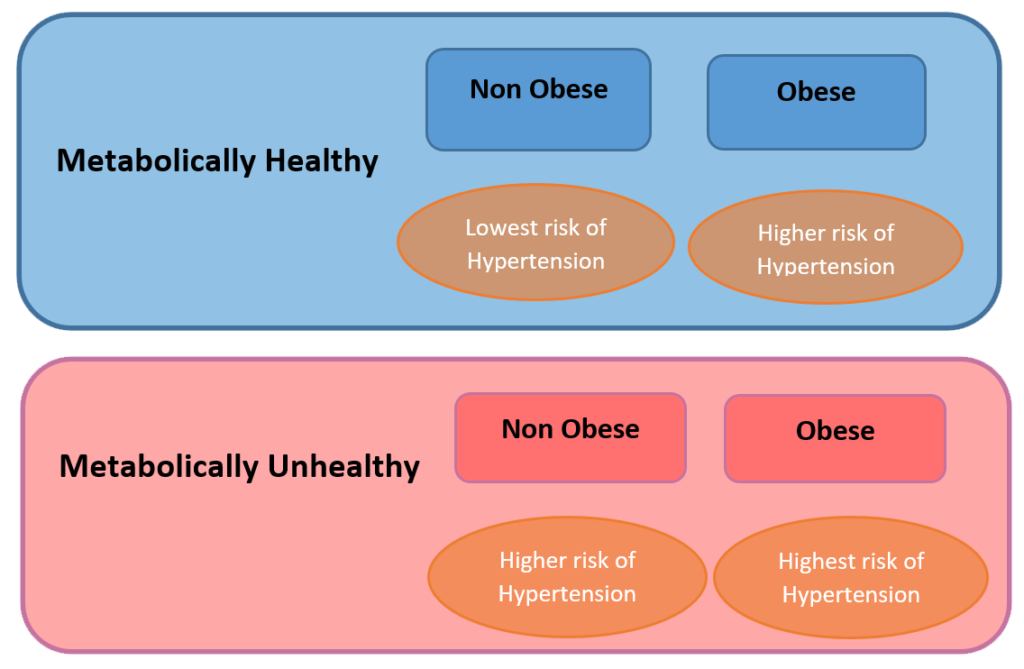
Depression control through exercise or physical activity?
May 6, 2022
What is the role of contraceptive pill in reducing the risk of type 2 diabetes in women with polycystic ovary syndrome?
May 30, 2022Reviewer: Dr. Abid
Hypertension is a term used for increased blood pressure which increases the risk of heart and blood vessel diseases (cardiovascular diseases CVDs). Although it is an amendable factor, yet its occurrence is increasing rapidly in developing countries. According to recent data, about a quarter of men and one fifth women suffer from hypertension and it is responsible for 45% of deaths from CVDs.
Things that can increase your risk of high blood pressure include lack of physical activity, kidney disease, being overweight or obese, diabetes, high salt intake and unhealthy diet. Out of these, obesity also helps in the progression of CVDs, Type 2 Diabetes, cancer and inflammatory diseases. Researches show that obesity, with its pro-inflammatory effects and oxidative stress, can cause insulin resistance, increased cholesterol and other disorders related to metabolism. This is referred to as unhealthy obesity. In addition to this, individuals in unhealthy non-obesity category are at an increased risk of diabetes, CVDs, fatty liver and higher death rates. Healthy obesity describes when a person has obesity but also a healthy metabolic profile. An emerging consensus has been that although healthy obese individuals show some protection from chronic disease, yet they still seem to be considerably less protected than those who are healthy and non-obese. On the whole, healthy obese people should be encouraged and supported to manage their weight.
Research Study:
A large number of Kurdish people (6747) from Iran, with obesity, between the ages 35-65 years took part in a study to understand the link between types of obesity and development of hypertension. Among these, 393 were new cases of hypertension and the rest were considered as a sub group. The study participants were surveyed from October 2014 to January 2017 and followed up until January 2021.
Researchers divided participants into the following four groups:
- Unhealthy Obesity – BMI > 30 kg/m2 and having at least two metabolic disorders which could be high levels of lipids in blood, having hypertension or receiving anti-hypertensive medication, and high blood sugar levels or receiving medication for diabetes.
- Healthy Obesity – BMI > 30 kg/m2 and having at most one metabolic disorder mentioned above
- Unhealthy Non-obesity – BMI < 30 kg/m2 and at least two of the above-mentioned metabolic disorders
- Healthy Non-Obesity – healthy individuals without obesity and metabolic disorder or having at most one metabolic disorder.
Results
Analysis of the study data revealed that the risk of developing hypertension increased in healthy obese individuals compared to healthy non-obese (6.2% compared to 4.4%). Also the risk remained high in unhealthy non-obese compared to healthy non-obese (7.7% compared to 4.4%). Moreover, the risk of hypertension significantly increased in unhealthy obese participants compared to healthy non-obese (10.9% compared to 4.4%).

Conclusion
To summarize, the present study showed that both healthy and unhealthy obese individuals are at an increased risk of developing hypertension compared to healthy non-obese individuals. In addition, unhealthy non-obese can also have an increased probability of developing hypertension. However, unhealthy obesity and unhealthy non-obesity types increase the risk of hypertension occurrence more than healthy obese and healthy non-obese individuals. Obesity affects people all over the world and puts them at a risk of developing certain health problems leading to increased health system costs. Hence, to prevent hypertension, maintaining normal body weight and controlling central obesity as well as visceral fat is highly recommended.
Reference
Metabolically healthy versus unhealthy obese phenotypes in relation to hypertension incidence; a prospective cohort study
https://bmccardiovascdisord.biomedcentral.com/articles/10.1186/s12872-022-02553-5



